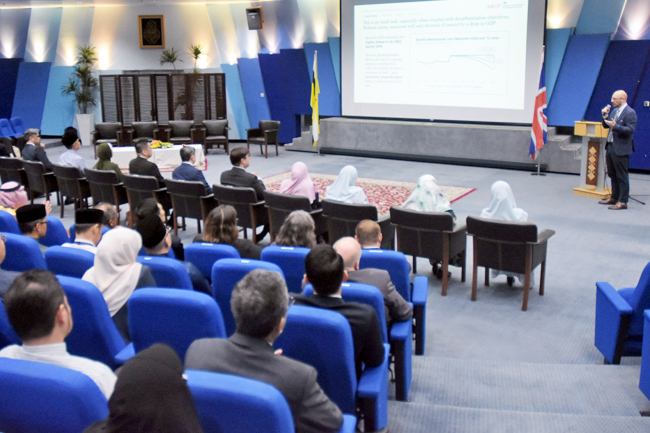The three pillars that strengthen Brunei’s economic resilience and prosperity while meeting its environmental goals were highlighted by ARUP Singapore’s Brice Richard during his presentation at the launch of the United Kingdom(UK)-Brunei Green Economy Report recently.
Richard, who served as the consultant for the report, outlined decarbonisation of the existing downstream oil and gas sector, development of new green economic opportunities in the upstream and downstream oil and gas sectors, and development of other non-oil and gas sectors for economic diversification.
“Climate goals must not come at the expense of Brunei’s economic prosperity or vice versa; there must be a balancing of both parties. In addition, by examining climate change from an economic, social, and environmental lens, the report quantifies the impact that being green can have on Brunei in terms of gross domestic product (GDP) growth and job creation. The reports also look more deeply into the feasibility of capturing opportunities and provide clear short-term actions for stakeholders to consider,” said Richard in the report.
“The UK-Brunei Green Economy Report has also identified four priority opportunities that not only can meet Brunei’s economic objectives but also social and environmental, such as transition to renewable energy, carbon capture services, clan hydrogen export hub, and consumer and industrial waste recycling. The combination of the opportunities can contribute to the economy in an annual gross value added (GVA) of USD670-800 million, a construction GVA of USD690-1,090 million, the creation of 10,000-16,000 jobs, and an emissions reduction of 3.8-6.2 million tonnes per annum of carbon dioxide by 2050,” he added.
Richard also highlighted the needs to build capacity across five enablers: such as; policy and legislation to regulate PV (photovoltaic) tariffs, the CCS (carbon capture and storage) regulatory framework, competitive carbon prices, H2 (hydrogen) safety standards, waste separation policies; partnerships for capital and expertise; commercial models for CCS from small-scale to full deployment; hydrogen test bedding; and industrial clusters. The enablers also included capacity building, which is a combination of vocational training, specific curricula in universities, and retraining of the existing oil and gas workforce.
Additionally, funding and incentives comprise the need to develop the green finance sector to attract new sources and streams of finance, and lastly, infrastructure, whereby the retrofit of grey hydrogen plants with CCS, infrastructure for hydrogen derivatives, spatial planning for rooftop PV and grid upgrades.
“Renew existing strategies and policies, engage outside experts on key development areas, start communicating with and educating the public, and establish a dedicated organisation to drive implementation,” said Richard.
Minister at the Prime Minister’s Office and Minister of Finance and Economy II Dato Seri Setia Dr Awang Haji Mohd Amin Liew bin Abdullah with British High Commissioner to Brunei Darussalam John Virgoe were also present at the event. – James Kon







